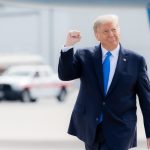The latest maneuver surrounding TikTok paints a vivid picture of the state of political affairs in America. As the clock struck midnight on Sunday, the Communist Chinese app TikTok was effectively banned in the United States, thanks to stringent measures laid out in Public Law 118-50. This law, specifically designed to protect Americans from foreign adversaries, seemed to achieve its goal, at least temporarily. But it didn’t take long for President Trump to stir the pot, declaring a 90-day reprieve via social media, which has been interpreted more as a strategic partnership with the ChiComs than a genuine attempt to protect American interests.
In a baffling twist of irony, Trump’s approach appears to favor keeping TikTok alive, advocating for a joint venture that would grant the U.S. a hefty 50% stake in this Chinese-controlled platform. This proposal is astonishingly misplaced considering the very purpose of the ban was to counter the data security threat posed by the app’s Chinese ownership. It raises eyebrows when the leader who once took a hard-line stance against TikTok now advocates for a cozy partnership with the very government that has so many Americans concerned about privacy violations and espionage.
The history of this saga is nothing short of convoluted. Trump first attempted to restrict TikTok operations back in 2019 with an Executive Order, only for it to be scuttled by the courts. After more attempts to divest the platform from its Chinese owners were foiled by the current administration, he has now seemingly reversed his position, pushing for a return to operations under the guise of a partnership. Meanwhile, Congress has expressed bipartisan outrage over this latest development, insisting TikTok must be severed from its communist roots entirely if any future operations are to proceed.
Within a mere day of Trump’s announcement, TikTok was back in business, thanks to his so-called efforts. But one must wonder if this resurrection is built on shaky legal ground. The law enforcing the ban is clear, and Trump’s proposed extension seems to lack the necessary prerequisites outlined in the statute. It’s as if he is trying to pull a rabbit out of a hat, yet the hat belongs to the magician’s adversary. Lawmakers have pointed out that any attempt to keep TikTok operational without divestment is in direct conflict with the legislation designed to protect Americans.
Donald Trump Has Thrown the ChiComs a Lifeline on TikTok, but Will It Save Them? https://t.co/6Cj0HW8y9j
— Tim Egan (@timaeg54) January 19, 2025
Critics of the plan worry that by not enforcing the law as it currently stands, Trump could inadvertently bolster the Chinese Communist Party’s control over TikTok. With the company publicly refusing to consider any divestment, it raises an important question: What does TikTok have to gain by keeping its U.S. operations alive if not to perpetrate its data collection agenda? The idea that an American partnership could somehow safeguard users’ data is as naive as giving a wolf the keys to the henhouse.
In striking contrast to Trump’s unorthodox tactics, key Republican figures like Speaker Mike Johnson have reaffirmed their commitment to enforcing the ban, citing the serious implications for American security and privacy. With a razor-thin majority in the Senate and legitimate legislative work to be done, it is hard to fathom how this proposal can gain traction in the coming weeks. A more pressing issue may well be whether Trump is underestimating the resolve of those within his own party who recognize the gravity of allowing a Chinese company to continue operating unfettered in the U.S. marketplace.




